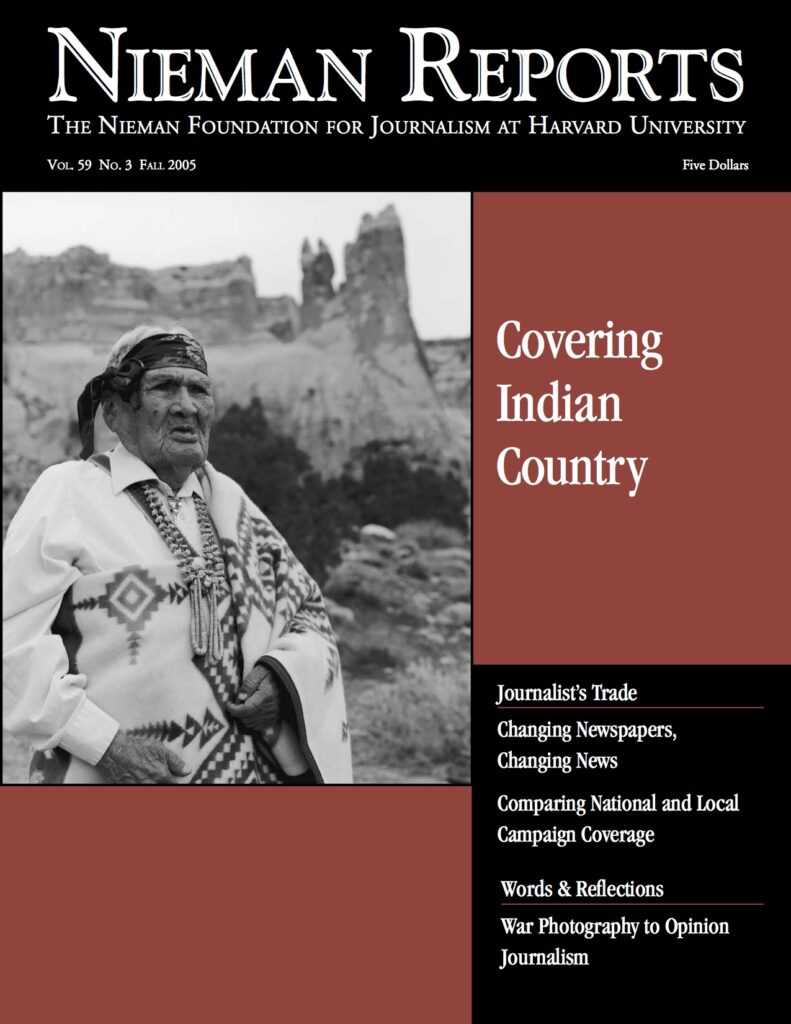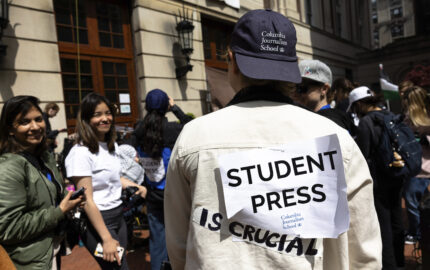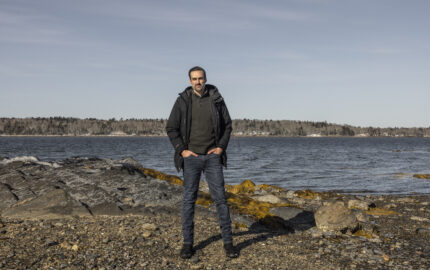
Covering Indian Country
As a young reporter at The Rapid City Journal, Tim Giago was seldom allowed to cover stories on the nearby Pine Ridge Indian Reservation where he was raised. As one editor told him, being Native American meant he could not be objective in his reporting. In 1981 he moved back to the reservation to start a community newspaper called the Lakota Times. At that time it was the only independently owned weekly Indian publication in the United States. In this collection of stories, Native Americans and non-natives who tell stories about the lives of Indian peoples talk about their obligation to fairness and the skills they need to live up to this responsibility.
When dozens of reporters descended on the Red Lake Indian Reservation in Minnesota to cover a school shooting in March 2005, many were shocked by the tribal government’s response. A short time after the incident, in which a 16-year-old boy killed nine people before shooting himself, tribal officials closed the reservation’s borders. By early the next morning, reporters had been herded into a parking lot at the tribal jail, and if reporters ventured into the town of Red Lake, they were threatened with arrest.
As I grabbed a cup of coffee and a banana on the way out of the motel on the morning after the shootings, I eavesdropped on the conversation between two reporters who had never been to Red Lake before. One was incensed by the previous day’s experience when reporters had tried to get onto the reservation. “Who do they think they are, telling us what to do?” she was saying, with some disdain. “Someone needs to educate these people,” responded her colleague.
For a small number of journalists at Red Lake that day—including those of us who had come here before to report on the people who live on this geographically isolated reservation—this action taken by the tribal government was not unexpected. What many of our peers seemed to be having a hard time understanding, in the midst of trying to cover this emerging news story, were the legal and practical implications of tribal sovereignty.
Red Lakers stand proudly on their sovereignty. They live on land where generations of their ancestors walked, land that was never ceded to the U.S. government. This means it is within their rights to close the reservation. In fact, not many years ago, outsiders were required to carry a tribally issued passport.
Such restrictions are often the reality in Indian Country. There is no guarantee of a free press on reservations, nor any protected right to free speech for the people who live there.
In Indian Country, access by outsiders is gained through trust—a commodity that is painstakingly earned and easily lost.

Red Lake High School sophomore Christopher Morrison, 16, is surrounded by news reporters as he enters the North County Regional Hospital in Bemidji to visit a friend. March 2005. Photo by Monte Draper/Courtesy of Bemidji Pioneer.
Establishing Trust
Four days after the school shooting, Red Lake Tribal Chairman Floyd “Buck” Jourdain, Jr. relaxed the media restrictions. But by then, many reporters had already left town. He offered little sympathy for those who complained about the lack of press freedom on the reservation. “A lot of times nobody wants anything to do with us. Media doesn’t want to come here. People have no reason to come here, and they could care less,” the tribal chairman told reporters. “But now that we have this tragedy, all of a sudden our sovereignty is a question and the way we conduct ourselves and our tribal customs.”
Their time in the media spotlight left a bitter taste with many Red Lake residents. In the weeks following the shooting, stories appeared about teenagers on the reservation who were offered cigarettes in exchange for an interview and money being offered for information.
This sudden and difficult cultural clash between the members of the news media and those who live in Red Lake didn’t do much for that precious commodity of trust. A few days after the shooting, I stopped by a Catholic church in Bemidji, a small town near the reservation where many Indians do business and go to school. The church was hosting a prayer service for the Red Lake shooting victims. The service was sparsely attended, mostly by elderly white parishioners. An American Indian man and his wife seemed a bit out of place. He told me he didn’t have any connection to the Red Lake shooting. He was there only because the priest asked him to perform a traditional Native ceremony as part of the prayer service.
As we waited for the service to begin, a reporter from a national news outlet walked into the church. After a cursory look around, he headed directly for the only American Indian in sight—the wife of the man doing the ceremony. He introduced himself and asked if he could talk to her about the Red Lake shooting. She politely demurred, saying she had no personal connection to the shooting and only knew what she’d seen on the news. He was not easily discouraged. “But you are an Indian, aren’t you?” he asked with a touch of indignation.
Of course, as reporters, we pass in and out of peoples lives all the time and rarely do we really get to know them. That’s especially galling for many American Indians who place high value on respect and trust and inherently distrust people when they show up asking questions and demanding answers.
A few days after the media frenzy began, a tribal elder shook his head in dismay as he told about stopping at the Red Lake High School to offer tobacco and pray. As he prayed, cameras and microphones suddenly surrounded him. To him, the experience was as great an affront as a horde of reporters rushing the altar during mass might be to a Catholic.
He explained to me that during a crisis is not a good time to learn about a people and their culture. “When I get up and go outside my house and get ready to go to work, there are no cameras, no tape recorders, so I’m an invisible human being,” said Gichi-ma’ingan. “And when a tragedy happens all of a sudden here they are, saying ‘I have a lot of questions for you.’ My advice is come over to my house and visit when there is no tragedy. And then I can talk with you.”
I wonder how many visitors Gichi-ma’ingan will have.
Dan Gunderson is a reporter with Minnesota Public Radio. He has reported a number of stories about Red Lake, including an examination of press restrictions and relations during media coverage of the shootings.
As I grabbed a cup of coffee and a banana on the way out of the motel on the morning after the shootings, I eavesdropped on the conversation between two reporters who had never been to Red Lake before. One was incensed by the previous day’s experience when reporters had tried to get onto the reservation. “Who do they think they are, telling us what to do?” she was saying, with some disdain. “Someone needs to educate these people,” responded her colleague.
For a small number of journalists at Red Lake that day—including those of us who had come here before to report on the people who live on this geographically isolated reservation—this action taken by the tribal government was not unexpected. What many of our peers seemed to be having a hard time understanding, in the midst of trying to cover this emerging news story, were the legal and practical implications of tribal sovereignty.
Red Lakers stand proudly on their sovereignty. They live on land where generations of their ancestors walked, land that was never ceded to the U.S. government. This means it is within their rights to close the reservation. In fact, not many years ago, outsiders were required to carry a tribally issued passport.
Such restrictions are often the reality in Indian Country. There is no guarantee of a free press on reservations, nor any protected right to free speech for the people who live there.
In Indian Country, access by outsiders is gained through trust—a commodity that is painstakingly earned and easily lost.

Red Lake High School sophomore Christopher Morrison, 16, is surrounded by news reporters as he enters the North County Regional Hospital in Bemidji to visit a friend. March 2005. Photo by Monte Draper/Courtesy of Bemidji Pioneer.
Establishing Trust
Four days after the school shooting, Red Lake Tribal Chairman Floyd “Buck” Jourdain, Jr. relaxed the media restrictions. But by then, many reporters had already left town. He offered little sympathy for those who complained about the lack of press freedom on the reservation. “A lot of times nobody wants anything to do with us. Media doesn’t want to come here. People have no reason to come here, and they could care less,” the tribal chairman told reporters. “But now that we have this tragedy, all of a sudden our sovereignty is a question and the way we conduct ourselves and our tribal customs.”
Their time in the media spotlight left a bitter taste with many Red Lake residents. In the weeks following the shooting, stories appeared about teenagers on the reservation who were offered cigarettes in exchange for an interview and money being offered for information.
This sudden and difficult cultural clash between the members of the news media and those who live in Red Lake didn’t do much for that precious commodity of trust. A few days after the shooting, I stopped by a Catholic church in Bemidji, a small town near the reservation where many Indians do business and go to school. The church was hosting a prayer service for the Red Lake shooting victims. The service was sparsely attended, mostly by elderly white parishioners. An American Indian man and his wife seemed a bit out of place. He told me he didn’t have any connection to the Red Lake shooting. He was there only because the priest asked him to perform a traditional Native ceremony as part of the prayer service.
As we waited for the service to begin, a reporter from a national news outlet walked into the church. After a cursory look around, he headed directly for the only American Indian in sight—the wife of the man doing the ceremony. He introduced himself and asked if he could talk to her about the Red Lake shooting. She politely demurred, saying she had no personal connection to the shooting and only knew what she’d seen on the news. He was not easily discouraged. “But you are an Indian, aren’t you?” he asked with a touch of indignation.
Of course, as reporters, we pass in and out of peoples lives all the time and rarely do we really get to know them. That’s especially galling for many American Indians who place high value on respect and trust and inherently distrust people when they show up asking questions and demanding answers.
A few days after the media frenzy began, a tribal elder shook his head in dismay as he told about stopping at the Red Lake High School to offer tobacco and pray. As he prayed, cameras and microphones suddenly surrounded him. To him, the experience was as great an affront as a horde of reporters rushing the altar during mass might be to a Catholic.
He explained to me that during a crisis is not a good time to learn about a people and their culture. “When I get up and go outside my house and get ready to go to work, there are no cameras, no tape recorders, so I’m an invisible human being,” said Gichi-ma’ingan. “And when a tragedy happens all of a sudden here they are, saying ‘I have a lot of questions for you.’ My advice is come over to my house and visit when there is no tragedy. And then I can talk with you.”
I wonder how many visitors Gichi-ma’ingan will have.
Dan Gunderson is a reporter with Minnesota Public Radio. He has reported a number of stories about Red Lake, including an examination of press restrictions and relations during media coverage of the shootings.


